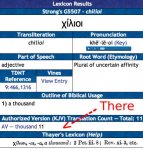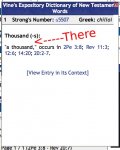G
"Oh! Look what I found!" (Please see attachment.)
I found the phrase 'of uncertain affinity' attached to 100 different words in Strongs Greek Bible Dictionary.
(A little research, and...)
It is not actually part of the definition of the word. Rather, it is a "comment" or "remark" that is related to the language use of the word and its similarity to other words.
A great many - if not most - of the words in the dictionary have these types of comments/remarks attached to them. (And usually listed first, before the definition begins.)
The phrase essentially means:
"The kinship of this word to other words is unknown." ("at least not with certainty")
It simply means that [Strong] could not connect the word (with certainty) to some other more original word or to a "lower-level" [root] word.
"That's my story, and I'm sticking to it!"

.
I found the phrase 'of uncertain affinity' attached to 100 different words in Strongs Greek Bible Dictionary.
(A little research, and...)
It is not actually part of the definition of the word. Rather, it is a "comment" or "remark" that is related to the language use of the word and its similarity to other words.
A great many - if not most - of the words in the dictionary have these types of comments/remarks attached to them. (And usually listed first, before the definition begins.)
The phrase essentially means:
"The kinship of this word to other words is unknown." ("at least not with certainty")
It simply means that [Strong] could not connect the word (with certainty) to some other more original word or to a "lower-level" [root] word.
"That's my story, and I'm sticking to it!"
.
Attachments
-
28.5 KB Views: 16
-
3
- Show all







